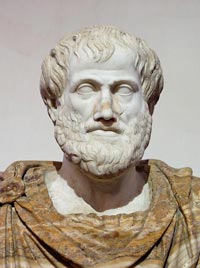
| Born: 384 BC at Stagira, Chalcidice |
| Died: 322 BC (at age 61 or 62) at Euboea |
| Nationality: Greek |
Aristotle was a Greek philosopher who lived over 2000 years ago. An avid student and teacher, he is often credited with forming the foundation of many Western philosophical ideals. His theories, writings and journals are still highly regarded in the field of social science.
Early Life
The Greek philosopher was born around 384 B.C. in a tiny town off the coast of Greece by the name of Stagira. The son of a physician to Macedonian royalty, Aristotle was exposed to the Macedonian court from a very early age. His father died when he was a young child and there is very little known about his mother, Phaestis. Because of this, Aristotle’s uncle by marriage, Proxenus, became the primary guardian until Aristotle reached the age of 17.
At the age of 17, Aristotle’s guardian arranged for him to receive his higher education at the Academy of Plato in Athens, Greece. While attending school at Plato’s Academy, Aristotle proved to be a worthy student and gained the respect of Plato. After many years of friendship and study, Aristotle moved on to pursue his own methodology.
Aristotle’s Teaching
Aristotle had made a name for himself in the world of academia. This helped him secure a job teaching the son of King Phillip II, Alexander the Great, in Macedonia. With the King’s blessing, Aristotle was then given the role of the head of the Royal Academy of Macedon. During this time, his pupils grew from one to a handful of future kings and noblemen. After several years of successfully working with Alexander the Great and others, Aristotle returned to Athens in 335 B.C.
In Athens, the philosophical ideals of Plato were still regarded as the leading school of thought. However, by this time, Aristotle had many ideals of his own and wished to start his own school. Lyceum was established in Athens as Aristotle’s academy of learning. Over the next 12 years, he spent the majority of his time teaching and writing. The students at Lyceum conducted research on many topics related to science, math, and government, plus much more. The written works of these students are credited by many as the start of ancient Greek libraries.
In 323 B.C., Alexander the Great died an unexpected death and the Macedonian government was overthrown. Because of the many works that Aristotle and his students wrote expressing sympathy for the Macedonian government, the new regime charged him with impiety. Aristotle quickly fled to Chalcis in order to prevent himself from being prosecuted. He would live on this island for the remainder of his life.
Aristotle’s Philosophy
It was Aristotle’s mission throughout his life to develop a uniform concept of logic. This concept would serve as the process for man to comprehend and learn all things that pertained to reality. His treatises explored descriptions and actions, while providing procedures for inferring and deduction. Aristotle was responsible for well over 200 pieces of work. His famous writings on logic include Categories, Posterior Analytics and On Interpretation.” In addition, his scientific and political works were way ahead of his time.
Aristotle was quite intrigued with the subject of “natural philosophy” or what is commonly known as natural science. Although not a scientist, his research helped to pave the way for modern scientific study. He was particularly interested in the field of geology. His method for classifying animals was used for hundreds of years before mistakes were found in his theory largely due to his lack of quantitative data.
Working with Marine Life
Dissecting marine life also captured the attention of Aristotle while he was at his school in Athens. These dissections led to many field journals that were surprisingly accurate for the time. He observed much of the marine life on Lesbos and was able to conclude that sea mammals were different than fish.
Aristotle’s writings gave descriptions of catfish, octopus, and cephalopods just to name a few. His study of marine biology allowed the anatomy of many sea creatures to be studied in greater detail than they ever had before.
Aristotle’s scientific studies did not stop with geology and marine biology. His treatise Meteorology was an attempt to tackle many topics within the earth sciences. From weather patterns, the water cycle and natural disasters, Aristotle gave his explanation for many common occurrences. His ideas were not widely accepted at the time, but were later deemed credible by many scientists during the Middle Ages.
In 322 B.C. Aristotle passed away, but his influence on the field of biology and other fields has remained a stronghold on Western sciences.